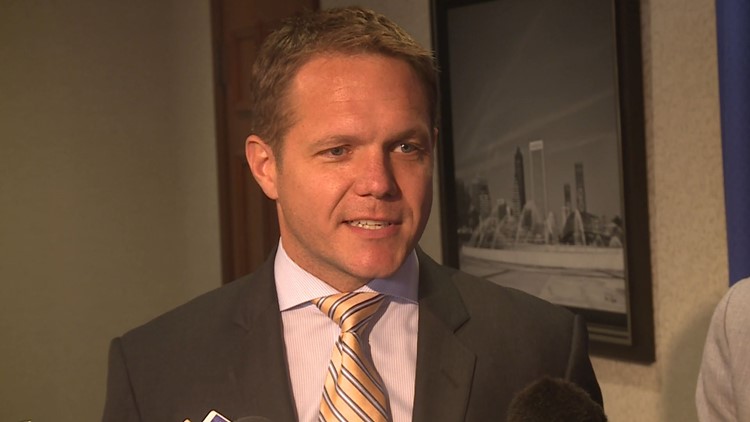JEA’s now-fired CEO Aaron Zahn told city attorneys last month that before the JEA’s board of directors approved a controversial bonus plan in July that he knew the plan could have resulted in a $280 million payout for employees if the city-owned utility was sold.
Zahn gave inconsistent answers to attorneys about what he knew about the bonus plan although he ultimately said he was aware early on of the bonus plan’s potential to yield an exorbitant payout.
Zahn made the statements under oath during an interview Jan. 21 and 22 with the city’s Office of General Counsel, which investigated Zahn’s tenure as JEA’s leader.
Zahn continued to distance himself from the bonus plan during the interviews, saying that it was created with input from other JEA executives and outside consultants at the direction of the board of directors. However, Ryan Wannemacher, who was dismissed in December as JEA’s chief financial officer, said in his interview Jan. 3 with the Office of General Counsel and Inspector General that Zahn was personally involved in directing specific aspects of the plan.
The Office of General Counsel’s investigation of Zahn found 24 instances of gross misconduct, negligence and breach of fiduciary obligation, which JEA’s board used to fire him for cause last week. The decision prevented Zahn from collecting any of the $842,000 severance he would have been entitled to if he was terminated without cause.
The bonus plan, which JEA referred to as the Performance Unit Plan or PUP for short, closely resembled a stock option plan, allowing employees to purchase “shares” of JEA for $10 a piece that could increase in value over a three-year period if JEA hit certain financial benchmarks.
Zahn initially told city attorneys that he didn’t realize a sale of JEA could have created a financial windfall through the bonus plan until shortly before city attorneys in November raised a number of legal concerns, which prompted JEA to abandon the controversial bonus plan.
But he gave a different answer near the end of his second day of testimony.
Zahn told investigators that he could “do the math” in his head and estimated the bonus plan yielding $280 million if JEA was sold for $2 billion or $3 billion. City attorneys asked if he believed the share price could increase from $10 a piece to $3,000 a piece under that scenario. He replied: “Uh huh.”
Zahn acknowledged that he came to this realization before July 23, when the board of directors gave Zahn the greenlight to pursue privatization and approved the bonus plan.
He said he told board members, including then-chair April Green, that a sale of JEA could impact the value of the bonus plan’s share but conceded that he didn’t share the financial figures he reached through his mental calculations.
Zahn also pushed back on a city attorney’s assertion that the 300-fold increase in share value was an “astronomical” gain.
“That’s your words,” Zahn said. “I’ve seen that happen in a number of different places in my, in my past. So astronomical? You know, it was a deferred comp plan.”
The Office of General Counsel released the transcripts of interviews with Zahn and every member of JEA’s executive team except Melissa Dykes, who was the chief operating officer before becoming the interim CEO after Zahn was suspended in December. It’s unclear if city attorneys interviewed Dykes.
Wannemacher’s said in his testimony that Zahn instructed him to use a specific formula to measure JEA’s change in financial performance, which was the basis for determining whether the bonus plan’s share would increase in value. That formula used a “challenge target” for the utility’s finances, and after hitting that challenge target, 10 percent of the additional dollars would go into a pool for making good on performance units bought by employees.
Wannemacher said that prior to the July 23 board meeting when the board approved the performance unit plan, he had not done any calculations on paper for how much the performance units would be worth if JEA were sold. He said Zahn never asked him to do any calculations for different financial models showing what the possible costs would be.
Support for JEA’s efforts to sell the city-owned utility began to sour among city officials after the City Council Auditor’s office revealed in November the uncapped bonus plan could have resulted in payout worth hundreds of millions of dollars if JEA was sold.
City attorneys focused much of the interviews with Zahn on his involvement and knowledge about the bonus plan, and roughly half of the allegations included in the investigation’s findings were related to the bonus plan.
JEA’s board of directors said Zahn failed to provide the full picture of the bonus plan prior to their vote. They said information provided to them led them to believe the plan’s value was capped at $3.4 million and that the city’s general counsel approved the plan. The bonus plan’s payout was uncapped and city attorneys had yet to review details of the plan. Jason Gabriel, the city’s general counsel, wrote in an internal memo that his office ultimately concluded the plan was illegal after they began reviewing it in August.
Zahn’s attorney has said the Office of General Counsel sought to “manufacture reasons and second-guess Mr. Zahn’s conduct” while ignoring the roles of JEA board members, Office of General Counsel staff attorneys, dozens of JEA employees, expert consultants, and outside legal advisers “in every decision at JEA.” He said Zahn plans to challenge his termination in arbitration.
A city attorney read a summary of the investigation last week, although the interview transcripts provided new details about the the investigation’s allegations and Zahn’s responses to questions, including:
‒ Zahn told city attorneys that the performance plan was created with input from a number of JEA executives, including Wannemacher, Dykes, Chief Administrative Officer Herschel Vinyard, and vice-presidents Kerri Stewart and Jon Kendrick.
‒ City attorneys asked Zahn if he remembered saying in April during an offsite meeting of JEA vice-presidents in Ponte Vedra that a small portion of the proceeds from a sale could be used to fund an employee bonus plan. They also asked if he remembered a vice-president, who they didn’t name, saying that he didn’t believe it would be appropriate for JEA to do that.
Zahn said he didn’t remember either happening. Earlier in the interview, he said he remembered hearing a discussion among executives about how portions of a sale could fund a bonus plan, but said he “didn’t recall” being the person who said that.
‒ City attorneys said Rhode, JEA’s then-attorney who has since resigned, and Jessica Lutrin, an outside attorney working for JEA, discussed in emails that management employees would be entitled to purchase more bonus plan shares than rank-and-file employees. Zahn said he wasn’t aware about that provision of the plan.
“That’s news to me,” he said.
‒ Sean Granat, a city attorney who participated in the interviews, asked Zahn what he knew about an argument that happened during an October meeting between city attorneys and Rhode and Vinyard about the bonus plan. Granat, who was at the October meeting, said the argument centered around his comments that the bonus plan was illegal and Rhode’s intention to participate in it was inappropriate.
Zahn said he heard that Gabriel, the city’s top attorney, had to “step in to calm the room.” Granat asked Zahn if knew Vinyard said he was going to call Gabriel and ask him to prevent Granat from attending any more meetings about the bonus plan. Zahn said he didn’t.
‒ City attorneys asked whether Zahn had discussed selling JEA with Mayor Lenny Curry or members of his administration. Zahn said he didn’t.
City attorneys also asked Zahn whether he had discussed possibly selling JEA with an executive from Florida Power and Light, whose parent company NextEra was considered to be the front-runner among companies that submitted bids to buy JEA. Zahn said he didn’t.



